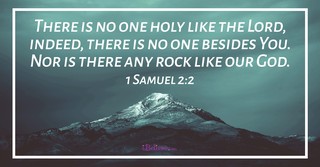What Does It Mean That There Is No One Holy Like God?
Share

There are times when Scripture can seem a bit confusing, especially when we combine certain passages and attempt to develop a theology. Here is an example.
Hebrews 12:14 says, “Strive for peace with everyone, and for the holiness without which no one will see the Lord.” Okay, so I’m supposed to strive for holiness — and it seems from this verse that if I don’t acquire it, then I will not see the Lord.
1 Samuel 2:2 says, “There is none holy like the Lord: for there is none besides you; there is no rock like our God.”
If I’m supposed to strive for holiness, but 1 Samuel 2:2 is telling me that nobody is holy like the Lord, what do I do? What does it even mean that “there is no one holy like God”?
Photo credit: Unsplash/Joshua Sortino
What Is the Context of 1 Samuel 2?

1 Samuel 2 is Hannah’s song. In the first chapter we are introduced to Hannah, who was “deeply distressed and prayed to the Lord and wept bitterly” (1:10) because she was barren and childless. Hannah vowed that if God granted her a son, she would dedicate him to the Lord.
God answered her prayer and she gave birth to Samuel. Samuel was then dedicated to the Lord’s service. The second chapter of 1 Samuel is the joyous song of Hannah. It is her testimony of the greatness of God.
It is helpful for us to identify genre. This was made evident in something which happened to the somewhat well-known pastor John Piper. Piper is known for his often serious, God-centered, and passionate preaching. He’s not known for levity. But when he began his sermon to a group of biblical counselors, by confessing some of his trepidation and shortcomings, he was met with uproarious laughter.
Piper was understandably confused. Why were they laughing when he wasn’t telling jokes? And why were they laughing? Genre.
There had been an error in the printed order of events. The audience was expecting a comedian. They were primed for laughter. They believed that his words were meant to be funny because they had placed him in the genre of comedy. But Piper wasn’t trying to be humorous — he was dead serious.
If we misunderstand genre, then, we can misunderstand the point the author (or speaker) is attempting to make. This is also the case with something like 1 Samuel 2. 1 Samuel is typically within the genre of historical narrative. But tucked away here in 1 Samuel 2 is a song — that’s in a different genre. It’s poetic. This means we must read Hannah’s words within the context of a poetic genre. What, then, does she mean in verse 2?
Photo credit: Unsplash/Ben White
What Does This Verse Mean?

In the first chapter, Hannah was mocked. But now her situation has been overturned. At this reversal of fortune, Hannah responds with exuberant praise to God. When Hannah says, “there is none holy like the LORD” she is pointing to the uniqueness and superiority of God.
What does it mean to be holy? It means to be entirely other. It means that He is pure, completely devoid of anything sinful or deceptive or wrong or hurtful. I like how Richard Phillips summarizes this:
“The holiness of God implies his separation from all his creatures, but it carries especially the notion of God’s moral perfection. Since God is holy, all his intentions for his people are holy. It is not possible for God’s motives to be perverse or callous or mean — even in judgment and especially toward his beloved people — for he is ‘of purer eyes than to see evil and cannot look at wrong.’”
What Hannah is really saying here in this verse is that nobody – no rival god – is as good as Our God. It’s a comparative statement. To circle back to the original question in regards to a verse like Hebrews 12, the two are making entirely different points. Hannah isn’t saying that it is impossible for anyone to be holy, as the Lord is holy. She is saying it is impossible for anyone to outdo God in holiness.
But this begs a question, is there anyone, outside of the Godhead, who is holy?
Photo credit: SWN/iBelieve
Is There Anyone, outside of the Trinity, Who Is Holy?

There is a key distinction to be made here. God is holy. We are made holy. God (Father, Son, and Spirit) are ontologically holy. It is who God is. If He ceased to be holy for one moment, then He would cease to be God. But it is impossible for God to stop being holy — because God does not change. In Him there is no shadow of turning.
We are not ontologically holy. Even Adam and Eve were not holy in the same way in which God was holy. They had to be made holy. They had to be set apart. But this does not mean that people cannot become holy — in the sense that we too can become morally pure, set apart, etc.
Ultimately, we are made holy through the work of Jesus Christ. His holy record becomes our holy record. But the work of the Spirit within us — the HOLY Spirit — transforms us into Christlikeness. Again, we are made holy.
We are also to pursue holiness. Consider 1 Peter 1:15-16, “…but as he who called you is holy, you also be holy in all your conduct, since it is written, ‘You shall be holy, for I am holy.’” We are supposed to accurately reflect God. And because God is holy, this means that we too must be holy. We are called to be holy, it’s not something we can acquire on our own, nor is it something which is innately ours. It is the work of God. Schreiner helpfully explains:
“All holiness stems from the God who called them into the sphere of the holy. The command to be holy indicates that the pilgrim people of God (1:1; 2:11) are to live differently. They are to separate themselves from the evil desires of the world and live in a way that pleases God. Some scholars rightly point to Lev. 18:2-4, where Israel is to distinguish itself from the evil practices of Egypt and Canaan. To be holy is to separate oneself from what is evil. The injunction to holiness embraces all of life (‘in all you do’). No sphere of life is outside God’s dominion.”
God’s holiness is the foundation of our own holiness.
Photo credit: ©Getty Images/GordonImages
How Does This Verse Encourage Us in Difficulty?

God is unflinchingly holy and pure. That means that He will never budge an inch when it comes to sin. Now, if I’m trying to get away with something, enjoy a besetting sin (as the Puritans called it), then His posture of holiness can be a bit…well, annoying.
“Can’t you just break the rules a little?”
“Why do you have to care so much about what I’m doing?”
But this unflinching holiness is incredibly good news when I need to depend on God as a rock. That is what Hannah found. God was her bedrock. He was unchanging. He was always pure. He always did the right thing. He always did what is good.
While that might be unsettling if we’re attempting to do that which is not good, it’s wonderfully good news if we’re pursuing righteousness. It can be great news if we’re a victim of the sin of another. We know that God is a sure and steady anchor. He will never lead us astray, He will never lead us into sin, nor will He ever do anything to us that is not for our ultimate good.
God’s holiness, then, become a bedrock of confidence when we encounter difficulty. He is always there to depend upon. Perfect in holiness. Unflinching in His love.
Sources
Richard D. Phillips, 1 Samuel, ed. Philip Graham Ryken and Richard D. Phillips, Duguid Iain M., 1st ed., Reformed Expository Commentary (Phillipsburg, NJ: P&R Publishing, 2012), 44.
Thomas R. Schreiner, 1, 2 Peter, Jude, vol. 37, The New American Commentary (Nashville: Broadman & Holman Publishers, 2003), 80.
Photo credit: ©Getty Images/Jair Ferreira Belafacce